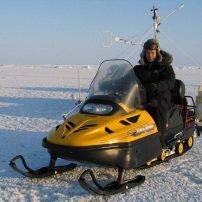
Collaborators
EISPAC scientists are liaising with a number of institutes and research scientists around the world concerning pollution stress in the changing Arctic.
Lead Investigators
-
 View full profile
View full profileProfessor Crispin Halsall
Co-lead investigator, Lancaster University
Crispin Halsall is a Reader in environmental organic chemistry at Lancaster Environment Centre (LEC), Lancaster University. His research expertise is in investigating the environmental fate and impact of synthetic organic chemicals, particularly persistent organic pollutants. Crispin is the co-lead investigator of EISPAC and will investigate the fate of organic pollutants in the sea ice system through both field and laboratory-based studies.
-
 View full profile
View full profileDr Kirstin Dähnke
Co-lead investigator, Helmholtz-Zentrum Geesthacht (HZG)
Kirstin Dähnke is a biologist and Deputy Head of the Department Aquatic Nutrient Cycles at the Institute of Coastal Research. Her research foci are on the nutrient filter in the coastal zone, especially on N transformations in estuaries and marine and coastal sediments. Kirstin Dähnke leads the research in Germany for the EISPAC Project.
Related Articles
-
Synthetic chemicals in sea ice
Jack Garnett and Max Thomas, both postdoctoral researchers in the EISPAC project, have contributed an article to the March edition of \"The Cryosphere and ATmospheric CHemistry\" (CATCH). Read more
25 March 2019 -
UK and Germany combine forces to fund crucial Arctic science
For the first time, the UK and Germany have joined forces to investigate the impact of climate change on the Arctic Ocean. The UK’s Natural Environment Research Council (NERC) and Germany’s Federal Ministry of Education and Research (BMBF) have jointly invested almost £8 million in 12 new projects to carry… Read more
03 July 2018







